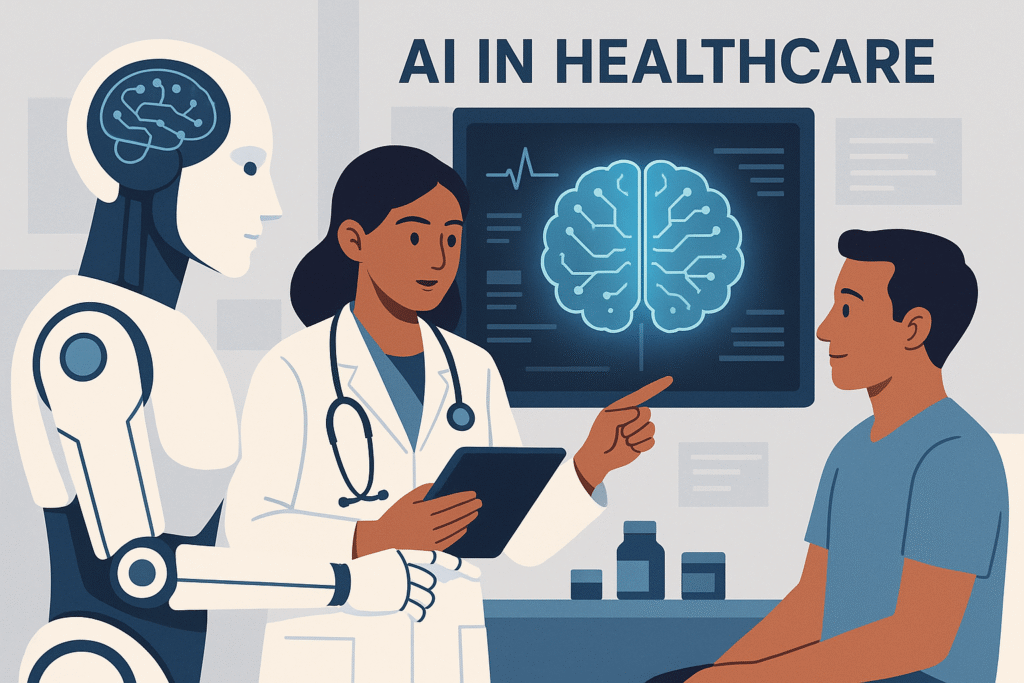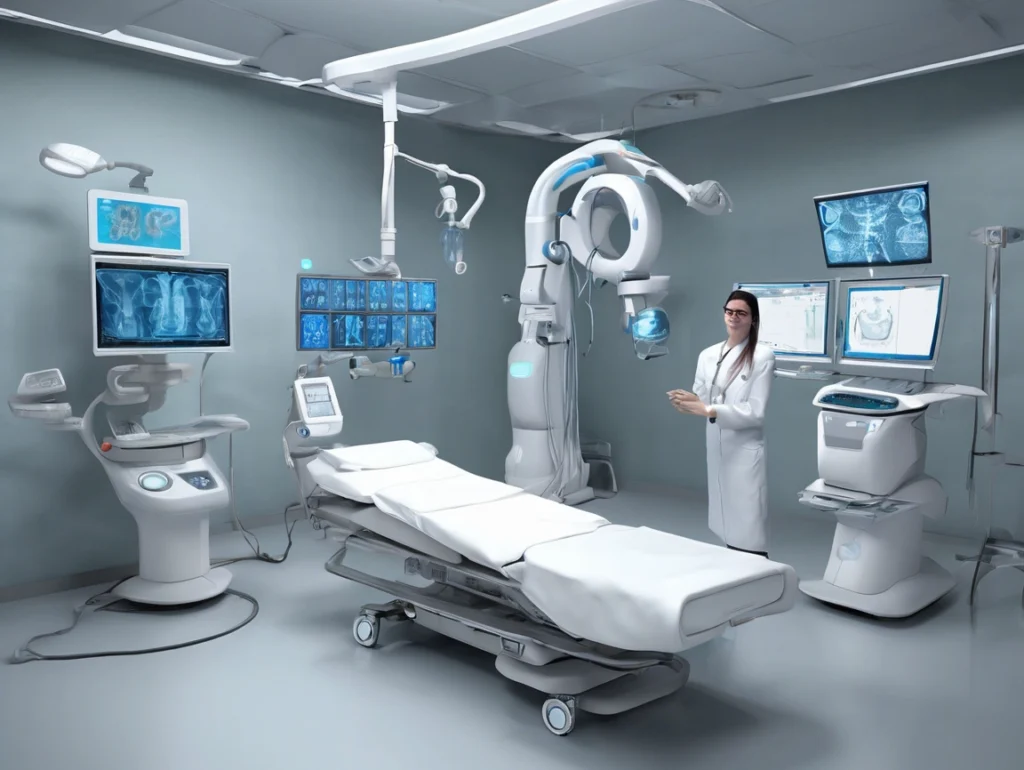Introduction: Embracing a New Era with AI in Healthcare
Imagine a world where diagnoses are delivered in moments, treatments are tailored precisely to individual needs, and hospital operations run seamlessly all thanks to cutting edge technology. This isn’t a distant dream; it is the reality of AI in Healthcare. Today, innovative applications are transforming modern medicine, and by harnessing the power of AI, healthcare professionals are steadily improving patient outcomes. In this blog post, we will explore how AI in Healthcare is revolutionizing diagnostics, treatment planning, and administrative processes, as well as the ethical and regulatory challenges that lie ahead.
Thank you for reading this post, don't forget to subscribe!Overview of AI in Healthcare and Its Transformative Impact
AI in Healthcare is not just another technological trend it is a paradigm shift that is reshaping the entire medical landscape. To understand this evolution, it is essential to compare traditional healthcare approaches with AI-driven innovations. Below is a comprehensive table that encapsulates the differences:
| Aspect | Traditional Healthcare | AI in Healthcare |
|---|---|---|
| Diagnostic Accuracy | Relies on manual analysis and physician expertise. | Utilizes advanced algorithms to process vast datasets, reducing errors and enhancing accuracy. |
| Personalization | Follows a one-size-fits-all approach with minimal individualization. | Crafts personalized treatment plans using patient specific data, including genetic and lifestyle factors. |
| Operational Efficiency | Involves administrative tasks that slow down decision-making. | Automates routine tasks and optimizes resources, thereby streamlining operations. |
| Data Analysis | Limited by human capacity to process large volumes of data. | Leverages big data in real time to uncover critical health patterns and trends. |
| Remote Monitoring | Relies on periodic check-ups and manual record keeping. | Implements continuous monitoring through wearables and sensors, ensuring proactive care. |
Consequently, these comparisons illustrate how AI in Healthcare promises not only operational efficiencies but also improved clinical outcomes through early diagnosis and personalized care.
Enhanced Diagnostic Capabilities with AI in Healthcare
AI in Healthcare for Advanced Imaging
Firstly, one of the most groundbreaking advancements in AI in Healthcare is in the realm of diagnostic imaging. Imagine radiologists empowered by AI-powered systems that swiftly analyze X-rays, CT scans, or MRIs with high accuracy. Research published by authoritative sources such as Nature demonstrates how AI systems can detect anomalies such as early stage cancer or neurological irregularities that might be overlooked during manual assessment.
- Speed and Efficiency: AI-powered imaging reduces the time required for diagnosis by instantly processing large volumes of data.
- Precision: These systems highlight minute details and patterns, ensuring fewer diagnostic errors.
- Cost-Effectiveness: Early detection facilitated by AI can significantly reduce long-term treatment costs by initiating timely interventions.
Thus, the utilization of AI not only enhances the capability of diagnostic imaging but also fosters improved patient outcomes by ensuring early and accurate diagnosis.
Personalized Treatment and Predictive Analytics in AI in Healthcare
Tailoring Treatments with AI
Moreover, AI in Healthcare is revolutionizing treatment strategies through advanced predictive analytics. With the advent of precision medicine, healthcare professionals can now design bespoke therapy plans that cater specifically to individual patient data such as genetic predispositions, lifestyle factors, and historical health records.
- Customized Therapy Plans: Data-driven algorithms analyze individual patient profiles and suggest tailored treatment regimens.
- Risk Assessment: Predictive models help evaluate potential complications before they arise, enabling proactive care.
- Improved Outcomes: Personalized treatment often translates into faster recovery and increased patient satisfaction.
For example, research from Harvard Medical School underscores how predictive analytics are used to refine treatment plans, thereby enhancing patient care while minimizing adverse drug reactions.
Streamlining Operations and Remote Monitoring with AI in Healthcare
Optimizing Healthcare Through Automation

In addition to direct patient care, AI in Healthcare is instrumental in streamlining hospital operations. Numerous administrative processes such as scheduling, record management, and inventory control have been traditionally time consuming. AI helps automate these tasks, allowing healthcare providers to focus more on patient care.
- Administrative Efficiency: AI-driven systems optimize scheduling and streamline record-keeping, reducing human errors.
- Remote Patient Monitoring: By integrating wearable devices and smart sensors, AI constantly monitors patient vitals, leading to early detection of potentially critical issues.
- Resource Optimization: Predictive analytics help hospitals manage resource allocation by forecasting patient influx and optimizing staff schedules.
For example, insights from Mayo Clinic reveal that continuous, AI-powered monitoring not only saves lives but also reduces hospitalization costs by preventing emergencies. Consequently, integrating Artificial Intelligence into hospital operations effectively minimizes inefficiencies while promoting a robust, proactive healthcare system.
Ethical Considerations and Future Challenges in AI in Healthcare
Navigating the Ethical Landscape
However, as promising as Artificial Intelligence in Healthcare is, it also presents a set of ethical challenges that must be carefully navigated. Data privacy, bias in algorithmic models, and ensuring transparency in AI-driven decision-making are some of the primary concerns.
Data Privacy and Security in Artificial Intelligence in Healthcare
Primarily, the success of AI applications hinges on the collection and analysis of large scale patient data. This dependence raises serious questions regarding data privacy and security.
- Patient Data Protection: Sensitive information must be rigorously safeguarded to prevent breaches and unauthorized access.
- Regulatory Compliance: Guidelines such as the General Data Protection Regulation (GDPR) ensure that data handling adheres to strict ethical standards.
- Building Trust: Transparent policies regarding data usage are essential to foster and maintain patient trust.
Addressing Bias and Ensuring Fairness in Artificial Intelligence in Healthcare
Additionally, it is vital to address the risk of inherent biases in the AI models. If the training data is skewed, the resulting models may inadvertently perpetuate healthcare disparities.
- Diverse Data Sets: Ensuring that datasets encompass a wide and diverse patient demographic is critical for developing unbiased algorithms.
- Continuous Monitoring: Regular audits and updates of AI models are necessary to identify and correct biases.
- Inclusive Development: Encouraging diversity within teams developing AI technologies is a proactive step in fostering ethical innovation.
Furthermore, transparency in Artificial Intelligence models often referred to as “explainable AI” is gaining traction as a necessary feature for building accountability and trust in healthcare systems.

The Road Ahead for AI in Healthcare: Integration, Research, and Collaboration
Interdisciplinary Collaboration in AI in Healthcare
Moving forward, the evolution of Artificial Intelligence in Healthcare is set to accelerate through interdisciplinary collaboration. Bringing together experts from technology, medicine, ethics, and policy fields is critical for creating solutions that are both innovative and practically applicable.
- Cross-Disciplinary Teams: Combining diverse expertise leads to the development of AI tools that are not only technically advanced but also clinically relevant.
- Collaborative Research Initiatives: Partnerships between research institutions and healthcare providers drive innovation by addressing real-world challenges through Artificial Intelligence.
- Global Cooperation: Organizations such as the World Health Organization (WHO) facilitate cross-border collaborations that underscore the global nature of healthcare challenges.
Regulatory Frameworks and Education in AI in Healthcare
In addition, establishing robust regulatory frameworks and enhancing education on AI applications are crucial for a sustainable future.
- Updated Policies: Regulators must evolve guidelines to address the rapid advancements in AI technologies while ensuring patient safety.
- Ongoing Training: Incorporating AI-focused curricula in medical schools and ongoing professional training ensures that healthcare professionals remain adept at using modern technologies.
- Public Awareness: Educating patients about how AI works, its benefits, and its limitations is equally important in building a trusted healthcare system.
Together, these steps will pave the way for an integrated and ethically sound application of AI in Healthcare, ultimately leading to improved clinical outcomes and more efficient hospital operations.
Conclusion: Shaping the Future of Medicine with Artificial Intelligence
AI in Healthcare is revolutionizing medicine, enhancing diagnostics, personalizing treatments, and optimizing operations. However, ethical considerations and regulatory challenges must guide its implementation to ensure equitable healthcare access. Collaboration between healthcare professionals, technologists, and regulators is essential to harness AI’s potential while maintaining human expertise. By advancing research, refining ethical standards, and promoting education, AI will drive a more efficient, inclusive healthcare system. Join the conversation and explore how AI continues to shape the future of medicine!
🌟 Stay Engaged & Keep Exploring!
The world is evolving, and knowledge is key. Whether it’s tech, health, business, or creativity, staying informed helps shape the future.
💡 What’s your perspective? Share your thoughts and insights!
📩 Stay Updated! Subscribe for the latest trends and expert insights.
🔍 Discover More! Explore in-depth articles and valuable resources.
Let’s learn, grow, and inspire together! 🚀✨




Comments are closed